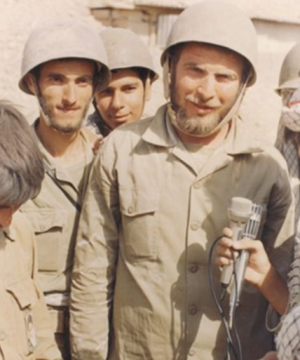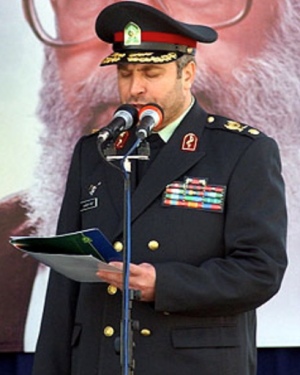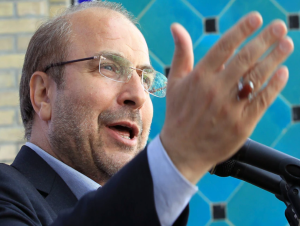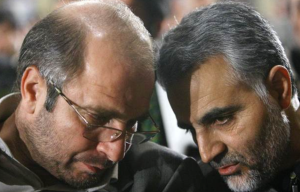Mohammad Bagher Ghalibaf: Speaker of Iran's Parliament
Download ReportPage Navigation
In June 2021, the Islamic Consultative Council, also known as the Majles or Parliament, elected Mohammad Bagher Ghalibaf as its speaker for the second consecutive year, a position he has retained since. In 2020, Ghalibaf had taken over from Ali Larijani, who was the longest-serving speaker in the history of the Islamic Republic. The Supreme Leader has significantly eroded the Parliament’s authority over the years, controlling the field of eligible candidates running for seats and exercising informal influence behind the legislature and the Speaker. As the head of one of the three branches, the Speaker sits on Iran’s Supreme National Security Council (SNSC) and the Supreme Economic Coordination Council.
Ghalibaf leads the neoconservative faction in Iran’s new parliament. A longtime fixture of the regime, Ghalibaf has a revolutionary and technocratic pedigree. Through the years, he has also alternated between branding himself as a pragmatic modernizer and a hardline authoritarian.
Military Career
 Ghalibaf during the Iran-Iraq War.
Ghalibaf during the Iran-Iraq War.
Born in 1961 in the town of Tarbaqeh near Mashhad in today’s northeastern Khorasan-e Razavi Province, Ghalibaf joined the Basij paramilitary and deployed to fight in the brutal counterinsurgency against Kurdish rebels in the West. He joined the Islamic Revolutionary Guard Corps (IRGC) after the Iran-Iraq War began (1980-1988) and became one of its youngest commanders. During the Iran-Iraq War, he developed close ties with Ali Khamenei (who is also from Mashhad), Qasem Soleimani, Esmail Ghaani, Nour Ali Shoustari, and other future leaders of the IRGC. Ghalibaf was at one point the commander of the Fifth Nasr Division. As scholar Ali Alfoneh has noted, Khamenei often visited the Fifth Nasr Division during the war. In fact, Ghaani served as Ghalibaf’s deputy and was later his successor as the commander of the Fifth Nasr Division at the end of the war. These connections—particularly with Khamenei—would prove instrumental in his rise.
Ghalibaf’s ascension to the regime's top ranks coincided with Khamenei’s ascension as supreme leader in 1989. He became deputy commander of the Basij, and went on to lead two organs of the IRGC. From 1994-97, he was the head of the Khatam al-Anbia Construction Headquarters during the post-war reconstruction marked by the Guard Corps’ expanded footprint into the Iranian economy. Later, Ghalibaf became the commander of the IRGC-Air Force from 1997-2000. During his tenure, Ghalibaf signed onto the infamous letter in July 1999 alongside other IRGC commanders, warning then-Reformist President Mohammad Khatami with removing him if he did not act more with regards to student protests.
 Ghalibaf in 2004 in Amin Police Academy
Ghalibaf in 2004 in Amin Police Academy
Afterward, the Supreme Leader appointed Ghalibaf chief of police or the Law Enforcement Force of the Islamic Republic of Iran (LEF). Ghalibaf’s selection was important as his predecessor Hedayat Lotfian was ousted following the student protests, and it was a signal of Khamenei’s confidence in Ghalibaf to professionalize the LEF during a sensitive period in the Islamic Republic. It was also a check on Khatami during his second term, as Ghalibaf was one of the original signatories to the aforementioned July 1999 public letter. A tape later emerged of Ghalibaf bragging to the Basij paramilitary about how he ordered police to fire at student demonstrators in 2003.
"The Most Corrupt Commander”
 Ghalibaf Campaigning for President while Mayor of Tehran
Ghalibaf Campaigning for President while Mayor of Tehran
Ghalibaf has shown ambition for the presidency several times but has thus far come up short. Yet, he has managed to acquire important positions like Tehran Mayor and Parliament Speaker. In recent years, he has been implicated and linked to a series of corruption scandals; his relationship and usefulness to powerful officials have shielded him from prosecution. His implication in series of corruption has led some to call him “the most corrupt commander” in Iran.
After his tenure at the helm of the LEF, Ghalibaf entered Iran’s political scene, running and losing the 2005 presidential race. In the 2017 presidential debates, former President Hassan Rouhani claimed that Ghalibaf in 2005 struck a deal to set free some large smugglers of narcotics and fuel in exchange for helping his campaign; Rouhani at the time was at the Supreme National Security Council, but the file on Ghalibaf never proceeded.
After losing the presidential race, Ghalibaf took over as mayor of Tehran, viewing that as a platform to launch himself to president. Ghalibaf’s mayoral tenure was defined by infrastructural feats, including the expansion of the Tehran metro and the Sadr expressway as well as the establishment of new green spaces within Tehran. Ghalibaf even made a cameo at the World Economic Forum in Davos in 2008, and sought to distance himself from then-President Ahmadinejad. In a New York Times profile, he flirted with another run for the presidency, pledging to open the country up to more foreign investment.
Ghalibaf’s tenure as mayor between 2005 and 2017 has been linked to a series of scandals and corruption. One of the most prominent cases was the municipality selling massive properties to several officials in the affluent northern Tehran at a heavy discount. A Parliament investigation was eventually shelved. A former council member accused that the wives of Ghalibaf and former Quds Force chief Qasem Soleimani were involved in corruption. In 2021, Ghalibaf’s former deputy at the municipality Issa Sharifi was sentenced to 30 years by a military court for involvement in multi-billion-dollar corruption related to Yas Financial Holding, a now-defunct subsidiary of IRGC Cooperative Foundation. Despite these blemishes in his record, the supreme leader managed to find a landing spot for Ghalibaf, appointing him to the Expediency Council.
Speakership of the Majlis and Increasing Pressure
 Left to Right: Ghalibaf with Qassem Soleimani
Left to Right: Ghalibaf with Qassem Soleimani
Seeking to capitalize on his management record, Ghalibaf embarked on additional runs for the presidency. In 2013, with Rouhani winning 50.7 percent of the votes, Ghalibaf came in second place with only 16.6 percent. Four years later, he ran against Rouhani again but faced opposition from the Principlist camp, in large part because of his public links to corruption. He withdrew and endorsed Rouhani’s challenger Ebrahim Raisi. In the 2020 Parliament elections, he tried his luck for the Parliament, capitalizing on low voter turnout and name recognition by winning a seat from Tehran. He then secured his position as Speaker of Parliament.
Ghalibaf’s tenure as Speaker has been marred by sustained corruption scandals. In 2022, he faced a number of accusations. Most notably, he was accused of being involved in a 2017 embezzlement scheme at Yas Holdings, an IRGC-linked company at which he was a board member. According to a leaked audio recording, he was involved in efforts to cover up the scandal using his regime connections. He was also accused of purchasing apartments in Turkey through his family and bringing luxury goods into Iran from the country.
Conclusion
As a result of continued corruption scandals – and with more skeletons in his closet – Ghalibaf is unlikely to seriously consider running for president in 2025, despite flirting with a campaign in 2021. While Ghalibaf continues to deny his record of corruption, he is now facing increasing criticism from within the regime’s hardline factions and core social base. Until now, despite the continuous corruption scandals, the incumbent speaker of the Islamic Republic’s parliament has avoided facing consequences due to the support he has received from supreme leader’s inner-circle, not least Mojtaba Khamenei. As pressure on Ghalibaf increases, his political fortunes and survival will very much depend upon his ability to sustain Khamenei’s backing.
Receive Iran News in Your Inbox.
Eye on Iran is a news summary from United Against Nuclear Iran (UANI), a section 501(c)(3) organization. Eye on Iran is available to subscribers on a daily basis or weekly basis.
Receive Iran News in Your Inbox
The Iran nuclear deal is done. And the world's biggest companies have already visited Tehran ready to strike a deal when sanctions end. These businesses will add even more to Iran's bottom line. And that means continued development of nuclear technologies and more cash for Hamas and Hezbollah.